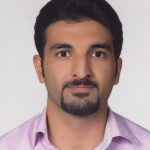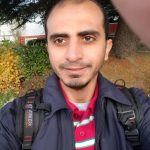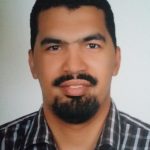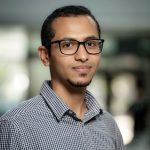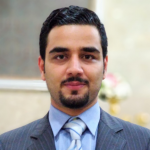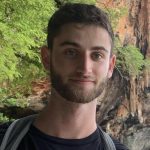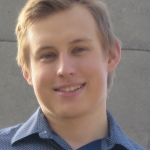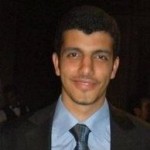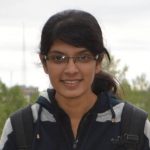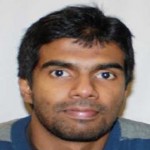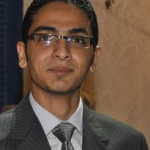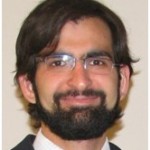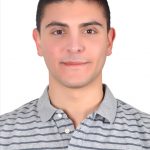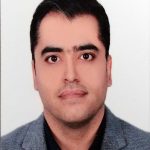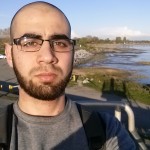Postdoc Fellows
Ata got his Ph.D. (2020) and MSc (2014) degrees in Microelectronics from Sharif University of Technology (Tehran, Iran), researching on energy-efficient SAR ADCs and multi-array SAR ADCs including applications in slow motion filming and bio sensors. He has been a member of Iranian National Organization for Development of Exceptional Talents since 2016. In 2020, Ata won the best Iranian Student Award Competition in the field of Engineering and in 2021, he won the Alborz Foundation National Prize for his industry and academic achievements. Since 2016, Ata has held part-time industry positions where he designed and tested mixed-mode & analog ICs such as Regulators, OpAmps, PLLs, and TRNGs for SmartCard ICs, and digital ASICs for control and calibration purpoes. After his PhD, he also worked at the Sharif University Integrated Circuit Design Center as a microelectronics senior engineer and consultant. During his free times, Ata has been working on commercial LED lighting solutions, solar cell based green energy systems as well as BMS and SOC modeling of Lithium-Ion Batteries in energy storage devices.
Currently at UBC, Ata is working on synthesizable (easily portable) ADC design, digital control of Silicon Photonic ICs, and Verilog-A modeling for silicon photonics devices.
Aboozar Ghorbani-Nejad received the B.S. degree in electrical engineering from the Shahid Chamran Technical College, Kerman, Iran, in 2007, and the M.Sc. and Ph.D. degrees from Tarbiat Modares University (TMU), Tehran, Iran, in 2013 and 2019, respectively. He received the Best Thesis Award for his M.Sc. dissertation from TMU in 2013. His Ph.D. work involved studies on the efficiently generation of harmonic power from transistors near their fmax and related problems. His current research interests include the design of integrated circuits at millimeter-wave and terahertz frequencies with particular emphasis on high-performance voltage-controlled oscillators (VCOs), frequency synthesizers, and power amplifiers.
Ph.D.
Hany Abolmagd Abdelraheem received his BEng and MSc degrees in Electronics and Communications Engineering from Cairo University in 2004 and 2011 respectively. He is currently working towards his PhD degree at the University of British Columbia. Hany was a Teaching/Research Assistant at both Cairo University and The American University in Cairo between 2004 and 2011. He worked as an Analog Design Leader at Si-Ware Systems fabless semiconductor company, Egypt, between 2011 and 2017. During his work at Si-Ware he shared, and led, several projects including MEMS Inertial Sensor Interface ASIC, MEMS Gas Flow Sensor Interface ASIC, NeoSpectra (Si-Ware’s proprietary Spectrometer) control ASICs and NeoSpectra product development. He was an intern at Microchip in 2021 and at Maxlinear in 2022. His research interests include RF, Analog and Mixed-signal circuit design.
Abdelrahman Afifi (co-advised with Prof. Lukas Chrostowski)
Abdelrahman Afifi received his B.Sc and M.Sc degrees in Electronics and Communications Engineering, Ain Shams University, Egypt, in 2011 and 2016 respectively. Currently, he is a PhD student in Electrical Engineering at the University of British Columbia. Between 2013 and 2016, he was with the Laboratory of Lasers and Optical Communications at Ain Shams University as a teacher and research assistant. His research experience includes fiber optic sensors, microwave photonics and optical coherence domain polarimetry systems. His current research interests include silicon photonics and circuits for optical quantum information processing applications.
Chen Yuan 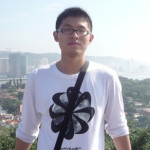
Chen Yuan received his Bachelor of Engineering (B.Tech) in Electronic Science and Technology from Xidian University, Xi’an, China in 2012 and his M.A.Sc degree in Electrical Engineering from UBC. He is currently working towards his Ph.D. degree as a Graduate Research Assistant. From 2012 to 2015, he was a research assistant with Shanghai Institute of Microsystems and Information Technology, where he worked on millimeter-wave receiver design. From 2015 to 2017, he was a graduate research assistant at UBC, where he workd on All-digital Phase-locked loops. He was a recipient of National Scholarship of China (2008-2009, 2009-2010), Top Scholarship of Xidian University (2009-2010), and Excellent Graduate of Xidian University (Class of 2012). He was an intern at Marvell and Intel in 2020-2021. His current research focuses on Phase-Locked Loops and wireline links.
Avilash Mukherjee (co-advised with Prof. Mieszko Lis)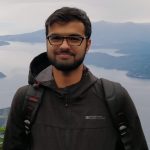
Avilash Mukherjee received his Bachelor of Technology (B.Tech.) and Master of Technology (M. Tech.) degrees, with specialization in Microelectronics and VLSI Design, from the Indian Institute of Technology, Kharagpur in 2018.
At IIT Kharagpur, he was a recipient of JBNSTS Scholarship (2014) and Certificate of Merit (2013).
He is now pursuing his Ph.D. degree in the Electrical and Computer Engineering department at the University of British Columbia. His major research interests include CMOS neural network accelerators, RF Transmitters and Mixed Signal Circuit Design.
Mohammed Al-Qadasi received his B.Sc. degree in Electrical Engineering (Electronics and Communication) from Qassim University (QU) in 2014, with first class honors, along with a shield and medal of academic excellence. Throughout 2013, he got involved in several internships, Cooperative and On-Job-Trainings, such as OJT in Yemen Airways maintenance division, MTN telecommunication company, NATCO Information Technology, SAFER Exploration & Production Operations Company (SEPOC), and General Directorate of Projects and Maintenance (GDPM) Organization. In 2018, he obtained his M.Sc. degree in Electrical Engineering (Electro-Physics) from KAUST University and is currently working towards his Ph.D. degree in ECE at UBC. His research interests include employing mixed signal integrated circuits and silicon photonics for optical computing and sensing.
Md Nazmul Hasan was born, and schooled at Dhaka, Bangladesh. He received B.Sc. Electrical Engineering from University of Engineering and Technology Peshawar (UET Peshawar), Pakistan in 2011, and M.S. in ECE from Sungkyunkwan University (SKKU), South Korea in 2019. He is now working towards his Ph.D. in ECE at UBC. He launched the world’s first CST-based antenna engineering YouTube channel called Tensorbundle in 2011. From 2011-2016, he worked at Tensorbundle as the founding engineer. He was the recipient of Presidential Scholarship in B.Sc. from Ministry of Education Bangladesh (2007-2011), and Outstanding STEM Student Scholarship in M.S from Sungkyunkwan University (2016-2019). He is a current recipient of Four Year Fellowship (FYF) in Ph.D. at UBC. His research interests include microwave and mm-wave antennas and smart surfaces.
Iman Taghavi (co-advised with Prof. Lukas Chrostowski)
Iman Taghavi received his M.Sc. and B.Sc. in Electrical and Computer Engineering from Tehran Polytechnic. Later, he joined the Beckman Institute for Advanced Science and Technology, the University of Illinois at Urbana-Champaign, Urbana, USA (2011-2012) where he developed the first CAD tool for multiple quantum well transistor lasers. From 2013-2015, Iman conducted research at the Center of Optics, Photonics, and Lasers at the Amirkabir University of Technology. From 2015-2017, he carried out research on the nanofabrication of electro-optic polymer modulators at the Georgia Institute of Technology in collaboration with the Institute of Electronics and Nanotechnology.
He joined the University of British Columbia in Jan. 2020 as a Ph.D. student. His current research is related to the fabrication of hybrid nanostructures for optical signal processing and ultra-high-speed communication systems. He is also working on Semiconductor Optical Amplifiers (SOA) and DFB laser integration using photonic wire bonding. He has been invited to join the technical program committee for Quantum Communications & Information Technology Committee and served as an invited reviewer for the SPIE Nanophotonics Journal. He was the recipient of the Merit Fellowship (North Carolina State University) (2015), and the AUT Research Council Graduation Award (2013).
Omid Esmaeeli finished his B.Sc. program in Bioelectric Engineering in 2016. He received his M.Sc. degree in Integrated Circuit Design from the University of Tehran, Tehran, Iran, in 2019. Now he is pursuing his Ph.D. degree at UBC as a research assistant. Between 2016 and 2019 he worked as a research assistant at Advancom lab at the University of Tehran, where he designed and taped-out RF and Mixed-Signal building blocks. The main focus of his M.Sc. research was design of injection-locked quadrature voltage-controlled oscillators. His research interests include circuit design for silicon photonic systems and lasers.
M.A.Sc.
Jake Osborne (co-advised with Prof. Lukas Chrostowski)
Jake Osborne received his B.A.Sc. in Electrical Engineering from the University of British Columbia in 2020. Currently, he is working towards his M.A.Sc in Electrical Engineering as a Graduate Research Assistant. Jake previously worked as a software developer for medical imaging technology where he was awarded the NSERC Undergraduate Student Research Award in 2018. He then worked as an Electrical Engineering Co-op at Vanrx Pharmasystems in Vancouver where he helped with low voltage analysis and the CE certification process in 2018. His research interests include silicon photonics and FPGA control systems.
Sean Lam (co-advised with Prof. Lukas Chrostowski)
Sean Lam received his B.A.Sc. in Electrical Engineering from the University of British Columbia in 2021. Currently, he is working towards his M.A.Sc in Electrical Engineering as a Graduate Research Assistant. His research interests include silicon photonics and CMOS integrated circuits.
Dias Azhigulov (co-advised with Prof. Lukas Chrostowski)
Dias Azhigulov received his B.Eng. degree in Electrical and Electronic Engineering from Nazarbayev University in 2020 with “Cum Laude” honor designation. Shortly after graduation, he joined “Fund for supporting research and development of artificial intelligence” CF in Nur-Sultan, Kazakhstan, where he worked on building automatic speech and text recognition systems. Dias is currently working towards his M.A.Sc. degree at the University of British Columbia. His research interests lie in Silicon Photonics, CMOS electronics, and applied Machine Learning.
Daniel Julien-Neitzert (co-advised with Prof. Lukas Chrostowski)
Daniel Julien-Neitzert received his B.A.Sc.in Electrical Engineering from the University of Waterloo in 2021. Currently, he is working towards his M.A.Sc in Electrical Engineering as a Graduate Research Assistant. Daniel previously worked as a lab assistant in the QITI group at the University of Waterloo where he worked on laser power stabilization. His research interests include integrated photonics and quantum computing.
Hosna Haghighat (co-advised with Prof. Lukas Chrostowski)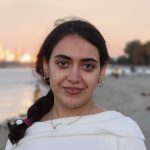
Hosna Kazerooni Haghighat received her B.A.Sc. in Electrical Engineering from Sharif University of Technology. In 2020, she worked as a research assistant at the Superconductor Electronics Research Laboratory (SERL), where she focused on Microwave Resonators as non-invasive biosensors. Hosna is currently working towards her M.Sc. degree at the University of British Columbia. Her research interests include silicon photonics and CMOS integrated circuits.
Kithmin Wickremasinghe (co-advised with Prof. Lukas Chrostowski)
Kithmin Wickremasinghe received his Bachelor’s Degree in Biomedical Engineering from University of Moratuwa, Sri Lanka in 2020. Currently, he is a first year MASc Student in Electrical and Computer Engineering (ECE) at University of British Columbia and a Graduate Research Assistant in the System-on-chip (SoC) Group. In 2018, he completed a Research Internship in the Artificial Intelligence R&D team at Telexistence Inc., Tokyo, Japan where he focused on applying computer vision and deep learning on the Telexistence Robot. He is the recipient of numerous international awards and the Manamperi Award (Engineering) 2020 from SLAAS for Most Outstanding Undergraduate Final Year Research Project. His research interests include Silicon Photonic Biosensors, CMOS IC Design and Point-of-Care Diagnostics.
Ensiye Ghorbanpour (co-advised with Prof. Lukas Chrostowski)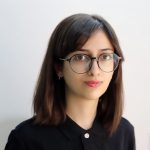
Ensiye Ghorbanpour received her B.Sc. degree in Electrical Engineering from the Iran University of Science and Technology (IUST). Between 2017 and 2020, she worked as a research assistant at the Applied Electromagnetics Lab at the IUST, where she mostly worked on tunable graphene-based metasurfaces for different THz applications. She is currently working towards her M.Sc degree in Electrical Engineering as a Graduate Research Assistant. Her research interests include Silicon Photonics and CMOS Integrated Circuits Design.
Pegah Tekieh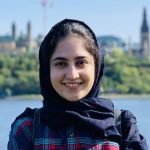
Pegah received her B.Sc in Electrical Engineering-Electronics stream from the Isfahan University of Technology in 2020. She worked as a research assistant at the Microelectronics Research Laboratory in 2019, where she researched the field of Power Supply on Chip. She is currently working towards her M.A.Sc degree in Electrical Engineering at the University of British Columbia. Her research interests include RF and mixed-signal integrated circuits.
Victor Sira received his B.A.Sc from the University of British Columbia in 2021. During his undergraduate degree, Victor and his capstone team were awarded the Faculty Design Award for overall project excellence considering both the technical achievements and engineering process. Victor also completed two years of co-op experience at Intel, Kardium, and TRIUMF where he worked in a variety of roles including hardware, firmware, and HDL design and verification. He is currently working towards his M.A.Sc degree as a Graduate Research Assistant at the University of British Columbia. His research interests include RF, analog, and mixed-signal circuit design. When not in the lab, Victor may be found enjoying nature, hiking, and camping in British Columbia’s mountains.
Ben received his Bachelor’s Degree (BaSc.) in Nanotechnology Engineering from the University of Waterloo in 2022, graduating with the Dean’s Honour List of distinction. Currently, he is a first year MASc. student in Electrical and Computer Engineering (ECE) at University of British Columbia and a Graduate Research Assistant in the System-on-chip (SoC) lab. In January 2019, he spent four months as a research assistant at Soochow University in Suzhou, China, where his research was focused on perovskite quantum dot solar cells. Here, he co-authored two peer-reviewed papers focusing on ligand management for improving material stability and the impacts of substituent group substitution on PV performance for all-polymer solar cells. In September 2019, he spent a semester abroad at the Hamburg University of Technology in Hamburg, Germany, studying the micromechanics of thin-film ceramics. Next, Ben completed two internships at Toyota Motors as a manufacturing engineer for upcoming vehicle powertrain and front suspension assembly. Lastly, Ben was one of the first members in a U-Ottawa based startup called Ekidna Sensing. He was a key member in developing an electrochemical biosensor into an on-the-market product. His work efforts here are currently patent pending. His research interests include silicon photonics, biosensing, and lab on a chip technologies.
Hassan Talaeian received his BSc degree in Electrical Engineering from Sharif University of Technology, Iran, in 2021. He worked in the ISDL group at Sharif University mostly on ASIC design and verification, and high speed high density PCB design. He joined UBC in 2022, and now is pursuing his MASc in Electrical and Computer Engineering. His research interests include Phase locked loops, and high speed circuits.
Dante received his BASc in Engineering Physics from the University of British Columbia in 2023. He is now working towards an MASc in Electrical and Computer Engineering (ECE) at UBC. His research interests include Laser design and locking on integrated circuits and silicon photonics systems.
Alumni:

